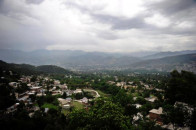Question of law: 10 pm cut-off for weddings contested
Government officials admit that it is illegal to impose Section 144 on weddings and other functions after 10 pm.

If the government intends to impose a rule, the government must abide by the law and make amendments to previous acts instead of imposing the emergency provision on weddings, officials said.
Section 144 of the Pakistan Penal Code prohibits the assembly of five or more persons in public and the carrying of firearms for up to two months.
“This is against the law. It’s a constitutional violation of Articles 18 (freedom of trade, business and profession), 24 (protection of property rights) and 9 (right to live),” said Barrister Azhar Siddique. “If the government wants to impose these rules, they have to do it according to the law; these impositions are just shortcuts and can lead to anarchy.”
Siddique explained that the law could easily be challenged in a court of law as Section 144 pre-dictates that there has to be a law and order situation. Only in cases where there is imminent law and order disturbance can the section be implemented, he explained.
He said that people had approached him with notices instructing them to implement this order and if these were pursued, Siddique was confident that the court would deem the imposition illegal. He said that it showed Parliament’s inefficiency as the government needed a simple majority to amend the Shop and Establishment Order of 1969 and the Marriage Act of 2003.
A city government official explained that there was no amendment to the Marriage Act therefore the imposition of Section 144 was basically a curfew on weddings.
He said that the Marriage Act’s one dish rule could only be enforced through Section 144 otherwise they could not enforce much of the Marriage Act.
The official explained that unless the Marriage Act was amended, they would be unable to remove Section 144. According to the Marriage Act, he said, the powers of enforcement were delegated to the Union Council level but under Section 144, the Town Municipal Officer (TMO) was empowered to direct the police or the police could take action without any TMO supervision.
Executive district officer (EDO) (Law) Ilyas Khan explained that Section 144 was imposed because of the security situation and the energy crisis. He said that these decisions had been made in the interest of the public. “Section 144 makes these gatherings after 10 pm unlawful,” Khan said.
The EDO told The Express Tribune that the government had the power to enact Section 144 on such issues if it was in the public’s welfare. He said that it was necessary to take a general perspective before inherently condemning the government.
The main complaint that people have against Section 144 is that it is used to impose the one dish rule from the Marriage Act, the EDO said. He said that generally speaking the 10 pm rule should be included in the Marriage Act through an amendment.
A major marriage hall owner felt that Section 144’s economic impact would be felt for a long period of time.
The elite, he said, had circumvented the law by holding lavish functions on private property, thereby, avoiding police inspection. “At the end of the day the electricity saving is minimal and the law a loss for WAPDA,” the hall owner opined.
“It’s a person’s whim and this limits a person’s point of view,” said the owner. “It’s also a loss in terms of convenience. It’s bad business practice closing down during the middle of a function.”
He added, “It’s funny how no other province has this restriction.”
Published in The Express Tribune, December 5th, 2010.



















COMMENTS
Comments are moderated and generally will be posted if they are on-topic and not abusive.
For more information, please see our Comments FAQ